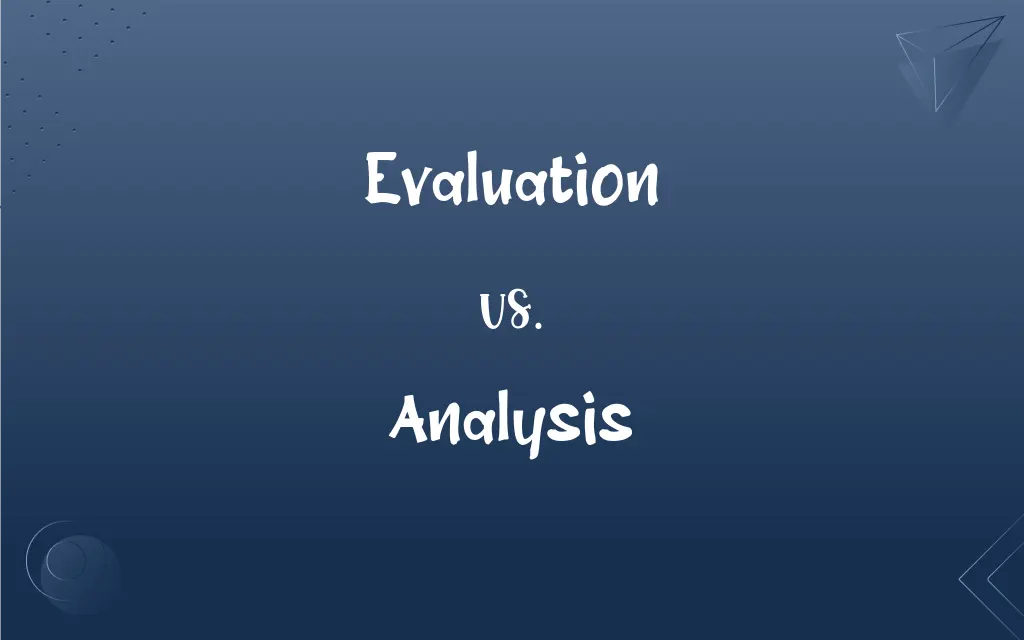Evaluation vs. Analysis: What's the Difference?
Edited by Aimie Carlson || By Harlon Moss || Updated on October 9, 2023
Evaluation involves assessing or judging the value of something, while analysis involves examining its components to understand or interpret it.

Key Differences
Evaluation commonly entails making a judgment about the quality, value, or worth of something based on certain criteria. This might involve considering the effectiveness, usability, or impact of an object, concept, or process. Conversely, analysis does not necessarily lead to a judgment. It involves a detailed examination of the elements or structure of something, often as a basis for discussion or interpretation, but without necessarily establishing its value or worth.
An evaluation might consider an object or concept holistically, judging it based on an overall impression or according to specific, predetermined criteria. It tends to conclude with a determination of worth or value, possibly recommending for or against it. Analysis, however, dissects the object or concept, examining its components or workings in detail. It seeks to understand, interpret, or explain, often breaking down complex entities into simpler parts to gain insight into their structure or function.
In evaluation, the person performing the action uses a set of standards or criteria to determine the value of the object being evaluated. It inherently involves a degree of subjectivity, as it is colored by the evaluator’s perspectives, criteria, and purpose for evaluation. Analysis, however, can often be conducted without inserting subjective value, aiming to explore and understand the constituent parts or inner workings of the subject. Analysts might scrutinize components, relationships, and patterns within the subject.
With evaluation, the primary goal is often to make decisions or judgments, potentially leading to action, such as implementing a program, purchasing a product, or changing a process. Evaluation often necessitates considering the fit between the item being evaluated and some external requirements or standards. Analysis might not necessarily drive decision-making in the same way. The goal of analysis is typically understanding, which might or might not be applied toward a particular decision or action.
Comparison Chart
Primary Goal
Determining value or quality
Understanding components and relationships
ADVERTISEMENT
Involves Judgment
Yes, involves assigning value
Not necessarily, more about understanding
Basis
Criteria or standards
Examination of components
Outcome
Decision or judgment
Insight and understanding
Approach
Often holistic
Detailed and component-based
Evaluation and Analysis Definitions
Evaluation
Evaluation often leads to a decision.
The evaluation of the software determined its adoption by the company.
ADVERTISEMENT
Analysis
Analysis seeks to interpret or explain.
His analysis of the data uncovered previously unseen patterns.
Evaluation
Evaluation typically involves judgment.
His evaluation of the film was less than favorable.
Analysis
Analysis might be used to form hypotheses.
Her analysis led to a new hypothesis about market trends.
Evaluation
Evaluation assesses worth or value.
The teacher’s evaluation of the essay was based on criteria like coherence and grammar.
Analysis
Analysis breaks down to understand components.
The analysis of the text revealed underlying themes of conflict and resolution.
Evaluation
Evaluation may be formal or informal.
The casual evaluation of the meal was that it was satisfactory.
Analysis
Analysis involves detailed examination.
Through careful analysis, the scientist discovered a flaw in the experiment.
Evaluation
Evaluation can be quantitative or qualitative.
The project underwent a thorough evaluation to check its viability.
Analysis
Analysis explores relationships and structures.
The analysis of the artwork showed a complex interplay of colors and shapes.
Evaluation
To ascertain or fix the value or amount of
Evaluate the damage from the flood.
Analysis
The separation of an intellectual or material whole into its constituent parts for individual study.
Evaluation
To determine the importance, effectiveness, or worth of; assess
Evaluate teacher performance.
Analysis
The study of such constituent parts and their interrelationships in making up a whole.
FAQs
Do evaluation results always involve numeric ratings?
No, evaluation can yield qualitative results, like feedback, in addition to or instead of numeric ratings.
Is analysis always detailed?
Typically, yes. Analysis involves a detailed examination to gain deeper understanding or insight.
What is the core purpose of evaluation?
Evaluation aims to assess the worth or value of something based on specific criteria.
What tools are commonly used in analysis?
Tools like spreadsheets, statistical software, and qualitative data analysis tools are often used in analysis.
Can one perform both evaluation and analysis simultaneously?
While they can be conducted in parallel, they serve different purposes: evaluation judges value, while analysis seeks understanding.
What is a common method used in evaluation?
Common methods in evaluation include surveys, interviews, observations, and testing to gauge value or efficacy.
Can evaluation be conducted without predetermined criteria?
Though not ideal, yes, evaluation can occur without predetermined criteria but it risks being less structured and objective.
Is analysis only applicable to quantitative data?
No, analysis can be applied to both quantitative and qualitative data to extract insights and understanding.
Can evaluation be considered a type of analysis?
Not exactly, though they are related. Evaluation makes judgments on value, while analysis seeks understanding without necessary judgment.
Can analysis lead to evaluation?
Yes, analysis can provide insights that inform evaluation, helping to determine the value or quality of an aspect.
Can analysis be performed without expert knowledge?
It's possible, but effective analysis often requires expertise to understand and interpret complex data accurately.
What might evaluation look at in a program’s effectiveness?
Evaluation may consider various aspects like outcomes, impact, feasibility, and adherence to objectives.
Is peer evaluation reliable?
Peer evaluation can offer valuable insights but its reliability may be influenced by the peer's expertise and impartiality.
What is a key difference between evaluation and analysis in research?
Evaluation typically assesses the quality or effectiveness of an aspect, while analysis dissects information to understand it.
Is analysis a necessary part of research?
Typically, yes. Analysis helps interpret data in research, providing essential insights to understand findings.
How might biases affect evaluation?
Biases can impact evaluation by influencing the judgment and interpretation of the evaluator, possibly skewing findings.
What does analysis primarily seek to do?
Analysis seeks to understand or interpret something by examining its components.
Can evaluation be objective?
While it aims for objectivity, evaluation often involves some degree of subjectivity due to inherent judgments.
How does analysis handle data?
Analysis dissects data to understand patterns, relationships, and structures, often using statistical methods.
Does evaluation always lead to an actionable outcome?
Not always, though ideally, evaluation informs decisions and actions, its findings may sometimes be inconclusive.
About Author
Written by
Harlon MossHarlon is a seasoned quality moderator and accomplished content writer for Difference Wiki. An alumnus of the prestigious University of California, he earned his degree in Computer Science. Leveraging his academic background, Harlon brings a meticulous and informed perspective to his work, ensuring content accuracy and excellence.
Edited by
Aimie CarlsonAimie Carlson, holding a master's degree in English literature, is a fervent English language enthusiast. She lends her writing talents to Difference Wiki, a prominent website that specializes in comparisons, offering readers insightful analyses that both captivate and inform.































































